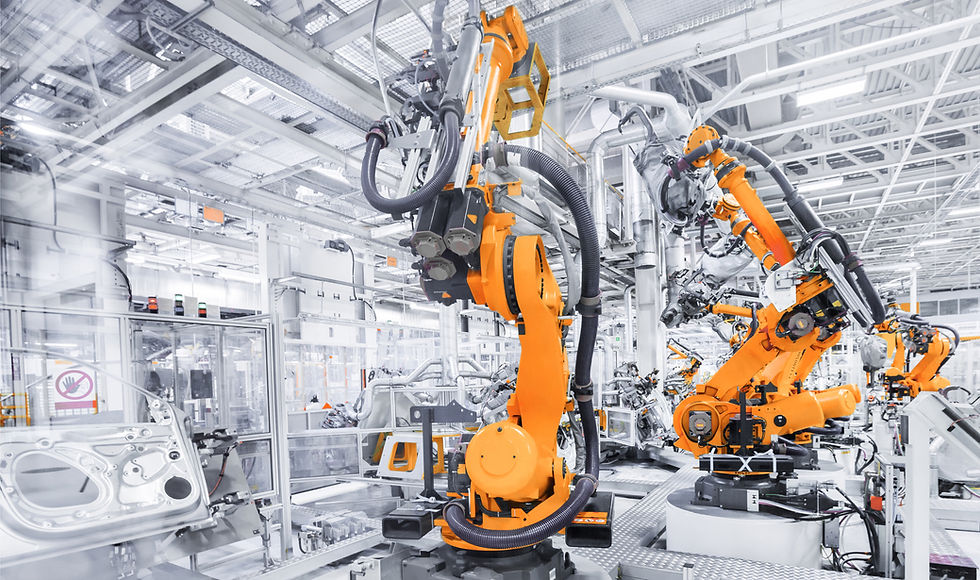Confronting the Future: The Risks of Avoiding Your First Automation Project
- Mahdi Kashani

- Mar 31, 2024
- 4 min read
Updated: Apr 15, 2024

In today's fast-paced and competitive market, small to medium-sized manufacturers are constantly seeking ways to maintain their edge. Automation presents a beacon of hope for manufacturers, promising increased efficiency, reduced costs, and heightened competitiveness. However, taking the first step into automation can feel overwhelming. Many hesitate to take the first steps, unaware of the dangers of inaction. This article aims to uncover why sidestepping automation could be a big risk for your business and how navigating this path could lead to transformative growth.
Why Automation Matters for Your Business
Integrating automation into your operations is a significant decision. It's natural to have concerns about the unknown, upfront costs, and potential disruptions to existing workflows. Yet, the risks of not embracing automation are equally important to consider. Without automation, companies risk falling behind competitors who have already adopted modern technologies.
Despite the uncertainties, embarking on your automation journey offers a unique opportunity to improve your operations and position your company for long-term success. By automating repetitive tasks and optimizing workflows, you can boost productivity, reduce lead times, and enhance product quality.
A report by The Manufacturer, published in 2019, found that only 16 percent of SMB manufacturers had implemented robotics, while a whopping 71 percent were unsure or did not plan to use robots. However, the industry is witnessing a paradigm shift. The global robotics market is predicted to skyrocket from $65 billion in 2021 to $180 billion by 2027.
Why Small and Medium-sized Manufacturers Hesitate
Many companies hesitate to embrace automation due to common concerns and misconceptions. From fears of job displacement to concerns about upfront costs, it's essential to address these myths head-on. Automation isn't about replacing workers; it's about augmenting their capabilities and empowering them to focus on higher-value tasks. While there may be initial costs associated with implementation, the long-term benefits far outweigh the investment.
The same study cited above by The Manufacturer revealed the following top five reasons behind these companies’ hesitation to using robots:
Inflexibility coping with product variation
High implementation costs
Products not easy to handle
Lack of programming and maintenance skills
Lack of finance
This lack of deployment among smaller companies can be due to many factors, but certainly the cost of adoption and fear of disruption to production are often-cited reasons.
Assessing and Addressing Key Challenges
Embarking on your first automation project can be daunting, especially for companies that have hesitated to embrace automation. To ensure success, small to medium-sized manufacturers must make strategic choices. Pinpointing bottlenecks, quality issues, and safety concerns specific to their operations is crucial before taking the plunge into automation. By addressing these areas, companies can ensure that their first automation project aligns with their business goals and enhances overall operations. It's essential to choose the right problem to solve. Whether it's improving efficiency, consistency, or safety, focusing on specific challenges guides automation strategies for optimal results. Implementing automation without careful planning can lead to dissatisfaction and wasted resources. By prioritizing key challenges and selecting suitable solutions, manufacturers can pave the way for successful automation initiatives.
Exploring Automation Options: Robots vs. Custom Machines
Implementing automation through robots versus custom machines presents distinct advantages and drawbacks for manufacturers. Robots offer versatility, capable of handling various tasks with minimal reconfiguration. They can adapt to changing production needs, promoting flexibility in manufacturing processes. Additionally, robots can improve efficiency and productivity, leading to cost savings over time. However, integrating robots requires expertise in programming and maintenance, along with significant upfront costs.
On the other hand, custom machines are tailored to specific operations, making them easier to implement initially. They offer simplicity and reliability for targeted tasks without the complexities associated with robotics. For companies hesitant to adopt automation, starting with a custom machine for a specific operation may be a more manageable option. It allows them to gain familiarity with automated processes before considering more advanced robotic solutions, easing the transition towards automation.
Taking the Leap
In conclusion, embracing automation is a significant decision for any small to medium-sized manufacturer. It's about more than just adding another tool to your arsenal; it's about transforming your entire approach to manufacturing and positioning your business for long-term success. While it requires careful consideration and planning, the potential benefits – increased efficiency, reduced costs, enhanced competitiveness – make it a worthwhile investment. It's not merely about staying relevant in a fiercely competitive market but thriving in it. As we navigate this evolution, let's seize the opportunities that automation presents and propel our businesses into a brighter future.



